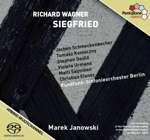|
Back
12/14/2013
Richard Wagner: Siegfried
Tomasz Koniecnzy (Der Wanderer/Wotan), Stephen Gould (Siegfried), Violeta Urmana (Brünnhilde), Anna Larsson (Erda), Matti Salminen (Fafner), Jochen Schmeckenbecher (Alberich), Christian Elsner (Mime), Sophie Klussmann (Stimme eines Waldvogels), Rundfunk-Sinfonieorchester Berlin, Marek Janowski (conductor)
Recorded live at the Berlin Philharmonie (March 1, 2013) – 227’30
3 Hybrid Super Audio CDs Pentatone PTC 5186 408 – Essays in German, French, and English – Texts and translations in German and English

   
I’m not sure which is more impressively ambitious: programming all 10 of Wagner’s major operas for concert performance over three seasons, or releasing recordings of all 10. Yet that’s what the RSB and Pentatone have done with the turnaround time for this Siegfried being particularly quick. Still, more impressive yet is the quality of the performance here. On the heels of their brilliant Die Walküre, the RSB and Marek Janowski present a gripping Siegfried.
The near impossible vocal demands of the title role are well documented, and remain the most challenging aspect of casting this piece. Janowski turned to American tenor Stephen Gould, his Tristan for a recording as part of the same cycle. Thrillingly, Gould is in good vocal shape and meets the technical demands—to a point. Gould’s voice is large, steely, and broad, all necessary qualities for Siegfried. There are flashes of brilliance in his singing and his best moments are indeed when he’s at his most subtle, as in his second act rumination amongst nature before encountering Fafner. When singing at moderate dynamics, in his middle voice, the sound is charming and youthful. As the voice passes above the staff, the sound can get unwieldy. Pitch is fine, but the timbre can get some bleat in it and sound disconnected from his middle and lower voice. This can be distracting, although his dispatching of Wagner’s treacherous leaps in the forging song were impressive enough.
Unsurprisingly, this can lead to a wooden portrayal that rises and falls in effectiveness based on vocal demands. Still, the demands are met (no small feat) and while Gould’s isn’t a Siegfried for the ages, his supporting cast helps raise this recording to a notable level.
Tomasz Konieczny once again joins Janowski following a fantastic Wotan in the aforementioned Walküre. Portraying the Wanderer with arrogance yet subtle knowledge of his impending mortality, the Polish bass lends his ringing voice this recording. The instrument is brassy yet complexly sonorous. The consistency of his singing is impressive as is his total dramatic command of every scene he is in, whether confronting Mime or Erda.
German tenor Christian Elsner is a scheming Mime. Not prone to overt caricature, Elsner sings with a snarling timbre and a dark undercurrent. His diction is searing and his voice resilient. If anything, he picks up steam as he goes along. As he unwittingly tells Siegfried of his treachery, Elsner’s Mime becomes even more loathsome and more vocally capable, using the core of his sound to carry the text.
The great Matti Salminen is a luxury as Fafner. This dragon is imposing (helped by a nifty echo effect), yet sympathetic in his dying confession to Siegfried. Jochen Schmeckenbecher’s Alberich is securely sung with a rounder, contrasting bass voice to Konieczny’s. He is detestable here without resorting to vocal tricks. Anna Larsson is a seasoned, but intimately voiced Erda. Sophie Klussmann is a superb woodbird, singing with spirit and precision.
Unfortunately, Violeta Urmana’s Brünnhilde is a bit of a disappointment initially. On the heels of a particularly ungraceful awakening, her singing contains a distractingly wide vibrato. The core of the sound still has quite a bit of beauty and does even out a bit, but the sound isn’t particularly nimble.
Marek Janowski and the RSB are still the undoubted stars of this cycle. Janowski leads a brisk performance that still manages plenty of room to breathe in its most intimate moments. The band responds impressively, playing menacingly in the prelude to the first act or exceedingly tenderly in the lead up to Brünnhilde’s awakening. The brass are particularly solid, playing with beautiful sonority and control. The second act horn solo is deftly and confidently dispatched.
As usual, the recorded sound is brilliant. Details abound and the stage is clearly laid out. In surround sound, the rear channel activity is just for ambience, but the effect is engrossing. Perhaps as a necessity of the concert performance, sound effects are kept at a bare minimum, but the transparency of the music benefits as a result.
As the Wagner anniversary year draws to a close, this Pentatone cycle must rank at the top of the list of most impressive tributes. While there are some vocal disappointments in this Siegfried, the cumulative performance is quite good. In sterling sound, collectors of the cycle can add this one without any reservations, and even seasoned veterans of other recordings will find much here to enjoy.
Matthew Richard Martinez
|